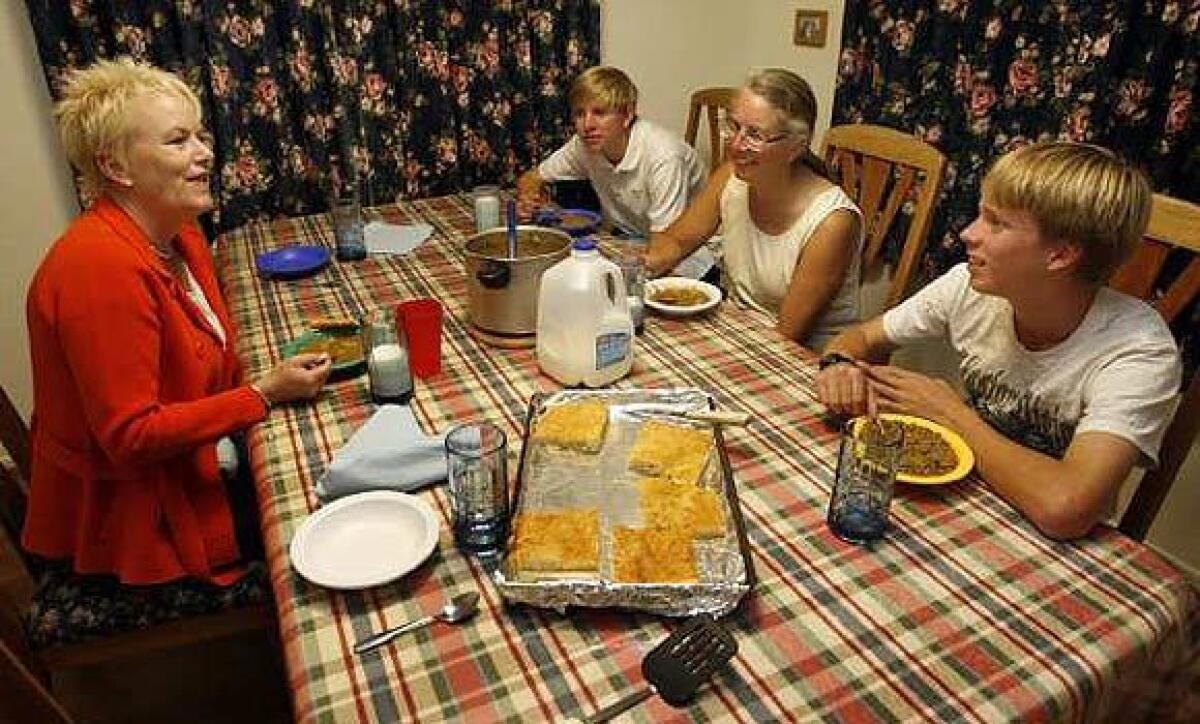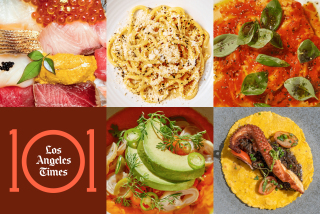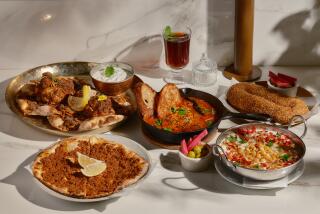Produce, lean protein should substitute for convenience foods

In this second installment of our ongoing series on nutritional makeovers, we explored the kitchen of Kristy Noble and her sons Scott, 14, and Robert, 17.
Noble wants to prepare quick, nutritious meals on a budget while teaching her sons to eat healthfully. Those good intentions are hampered by erratic eating habits and a diet that supplies lots of fat and sugar but scant amounts of essential nutrients.
Registered dietitian Lisa Gibson, an Irvine-based private consultant, explored the Nobles’ cupboards and analyzed their food diaries to get a better idea of where the family needs help.
Kristy Noble’s home is a tale of two diets.
Outside, cherry tomatoes grow abundantly in the well-groomed back yard; fruit trees yield apples; and a flourishing herb garden produces basil, sage and mint to spare. But inside, the freezer is stocked with 5-quart containers of ice cream; the cupboard holds tubs of cookies; and oatmeal, whole grains and skim milk share space with sugary cereals and fatty hamburger patties.
“I know we need to eat more vegetables,” says the Mission Viejo woman, “but how do you do that when you have four minutes to cook?”
Noble is a substitute teacher and tutors students at home, so her daily schedule is rarely regular. The lack of routine means she might grab a quick breakfast, then not eat until evening. Time-consuming recipes are out of the question; sometimes she and her sons scrounge in the kitchen for a late dinner at 9 p.m.
Scott and Robert are busy with soccer, studying and school activities. They often prepare breakfast on their own but sometimes skip lunch and arrive home hungry. Very hungry. Their appetites are healthy, to say the least -- a snack can be an entire quart of yogurt or a couple of peanut butter and jelly sandwiches. Noble has trouble stocking enough food for them, although she shops regularly and frugally, visiting several area markets to get the best deals.
Registered dietitian Lisa Gibson is impressed with the garden and the fact that Noble cans her own fruits and vegetables but is less awed by the family’s basic food supply. Starting in the garage, Gibson finds huge jars of Skippy peanut butter, cans of refried beans and large bags of cereal. She approves of peanut butter on principle -- it’s a terrific source of protein and good fats -- but she prefers more natural versions, without vegetable oil stabilizers and added sugar. The refried beans, low in fat and packed with nutrients, get high marks. “This can be considered a serving of vegetables,” she says. Some cereals pass muster, such as the Raisin Bran, but the crispy rice and cinnamon swirls don’t. “These don’t have a lot of fiber in them,” Gibson says.
Gibson stops in her tracks at a 6-pound, 9-ounce can of pears; Noble says the boys might devour the entire contents in two days.
“They are getting some fiber,” Gibson says, “but they’re also getting a lot of extra sugar and no protein.” A pattern is already emerging: “They need to get more nutrients,” she says.
In the kitchen, Noble prepares a lentil stew for dinner while her sons do homework. Gibson continues searching the cupboards and refrigerator. She finds good-for-you oatmeal and a jar of whole grains, plus cans of beans and tomatoes -- even tomatoes that Noble has canned herself. She also finds a stash of nuts and raisins -- Noble’s relatively healthy snacks when she doesn’t have time for a formal meal. “They’re fast, and they fill you up and keep you going,” Noble says.
The refrigerator has bright spots: several gallons of skim milk, a whole chicken, grapes, carrots and green beans. But a block of mild cheddar cheese, which does provide protein, is high in saturated fat and cholesterol.
The quarts of yogurt are a good source of protein and calcium, but Gibson points out that if one serving is 250 calories, eating a whole tub of the sweetened, low-fat kind would amount to 1,000 calories, 11 grams of fat and about 180 grams of sugar.
The freezer holds several bags of frozen vegetables and blueberries but also packages of pre-made hamburger patties (330 calories and 23 grams of fat each) along with three 5-quart containers of ice cream, which the family eats almost daily. Although it’s not premium ice cream, which has much more fat (a half-cup serving of the less expensive kind contains 140 calories and 7 grams of fat), it’s usually eaten in larger quantities. Tubs of Trader Joe’s cookies sit in the cupboard above the refrigerator. Then there’s Noble’s stash of dark chocolate chips. She says she might eat two to three handfuls at a time, depending on her stress level. Sixteen chips have 80 calories and 6 grams of fat.
Overall, Gibson likes the fact that the family eats at home every night, grows some of its own vegetables, doesn’t indulge in fast food and bans chips and soda from the house. But she worries that the mother’s and sons’ diets lack essential vitamins and nutrients -- important for Scott and Robert, who are active and still growing, and for Noble, who wants to lose 20 to 30 pounds.
Noble typically eats little all day -- perhaps a small bowl of cereal in the morning, followed by a few handfuls of nuts and maybe an apple, then dinner, which could be a tortilla with roasted chicken or an egg burrito. On one recent day, she consumed only 1,031 calories but didn’t eat her first meal until 6:30 p.m. That consisted of a cheese sandwich, followed by toast with jam and then chocolate ice cream -- foods that provided too much fat. Other days, she consumes too many calories.
Scott and Robert get protein from good sources (skim milk and yogurt) and not-so-good sources (hamburgers). Although they’re young and slim, they need to eat more balanced meals with many more fruits and vegetables and lean proteins. On one recent day, Scott consumed 3,476 calories -- largely from two bowls of Raisin Bran cereal, a chocolate shake, pasta, two hamburgers and a quart of yogurt.
Says Gibson to Noble: “I think you have good intentions, but you can’t quite get there.”
Vitamins MIA
After the visit, Gibson notes that the family’s diet is sorely lacking in fruits and vegetables. “Looking at their food diaries, I don’t think they had one serving of vegetables in three days. If you’re not eating fruits and vegetables, you’re missing vitamins like A and C and phytochemicals such as lycopene [found in tomatoes], lutein [found in green leafy vegetables] and flavonoids [found in citrus fruits and berries] that may help reduce the risk of cancer. They’re also missing vitamin B-12 and zinc, which are important for good blood formation and to prevent anemia.”
More lean proteins in their diets, such as fish and chicken, will help the boys build muscle fiber. Eating protein in the morning, especially, will quell hunger pangs.
“They’re filling up on comfort foods, which are easy to fix and inexpensive,” Gibson says. She also notes that having large quantities of tempting foods, such as ice cream, can trigger overeating. She recommends re-routing some of the budget away from sweets and simple carbs and toward more fruits and vegetables.
Among Gibson’s suggestions for Noble:
* Buy an inexpensive crock pot for simple main-dish recipes that include vegetables, such as chilis and stews. A dish prepared in the morning will be ready by evening, and most vegetables, which can be quickly rough-chopped, retain their nutrients and fiber after cooking.
* Add nutrition to pasta, which the boys usually eat with only olive oil and cheese, via tomato sauce and turkey meatballs.
* Mix fiber-rich plain cereals, which the boys don’t like, with the sweetened cereals they prefer.
* Replace cheddar cheese with feta, which is lower in fat and usually consumed in smaller quantities because of its strong flavor.
* Cook entrees on weekends and freeze them, providing meals throughout the week.
* Overhaul the snacks. Although Noble usually doesn’t prepare salads because the produce tends to spoil quickly, Gibson recommends combining dark, leafy greens, beans, tuna, canned salmon or chicken as an afternoon snack -- and topping it with an olive oil-based dressing that provides good fats. If the boys like it, chances are there won’t be many leftovers.
* Eat more regularly during the day, focusing on lean protein, which may make Noble specifically less compelled to pounce on the sweets.
Noble should stop skipping meals if she wants to lose weight. Not eating for long periods can slow the metabolism.
“Change can be really hard,” Gibson says, “but to make changes you can’t just say ‘I need to eat more vegetables,’ you have to pack carrots for lunch or have a salad for dinner. Make it specific and something that’s doable.”
More to Read
Eat your way across L.A.
Get our weekly Tasting Notes newsletter for reviews, news and more.
You may occasionally receive promotional content from the Los Angeles Times.






